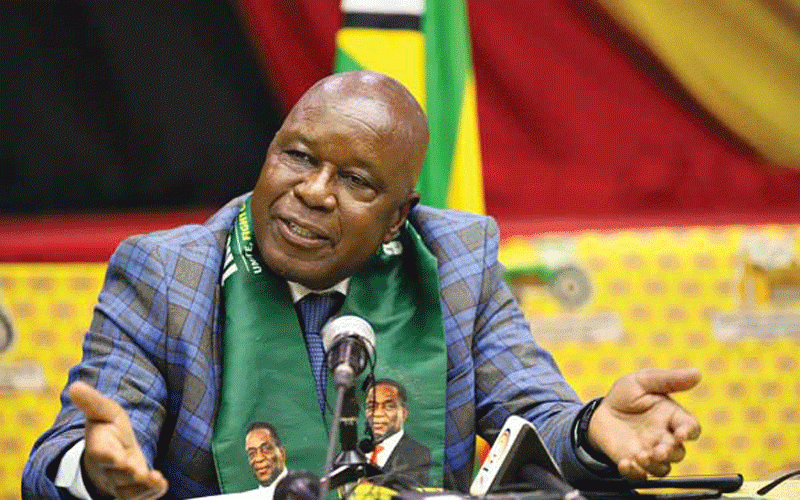
THE Judicial Service Commission (JSC) notes with great concern accusations and malicious reports being levelled on the person of the Chief Justice (CJ) Luke Malaba with the intent of aligning him with a political party, political discussions and political activities that occurred recently.
On November 11, NewsDay carried a letter to the editor with malicious falsehoods alleging that the CJ attended a political event on October 21, 2021.
We wish to advise that the CJ was never in attendance at the event in question, section 165(4) of the Constitution provides that members of the Judiciary must not engage in any political activities and section 165(4)(d) further states that they must not attend political meetings.
The allegations, therefore, that the CJ attended a political gathering are in the very least without basis and are malicious.
We, therefore, wish to assure you and the nation at large, that the CJ is well aware of these peremptory constitutional provisions and has no intention at all to violate them.
The CJ and, indeed, all the judges are apolitical and they fully understand the doctrine of separation of powers as enshrined in the Constitution.
We make these comments in the hope that you will publish them in response to the letter which you published on November 11, 2021 and you will in the spirit of objective journalism give them the same and equal prominence as the original letter. –CR Makoni–Thodhlana (JSC head of corporate services)
Let’s empower female farmers
- Chamisa under fire over US$120K donation
- Mavhunga puts DeMbare into Chibuku quarterfinals
- Pension funds bet on Cabora Bassa oilfields
- Councils defy govt fire tender directive
Keep Reading
THE roles that women play in agriculture vary from region to region and country to country.
Men and women often have complementary roles, sharing or dividing tasks in crop production, livestock raising, fishing and in care and use of the forests.
In other cases, women and men have distinct tasks and responsibilities for certain crops and livestock, fish and forests.
Where large-scale cash cropping has been introduced, the tendency remains for men to become involved in this sector, especially when it is highly mechanised, with women becoming increasingly responsible for household food production and small-scale cash cropping with low levels of technology.
Women also supply a significant proportion of the agricultural labour on plantations.
While there are significant variations by country, overall women in Africa play a major part in sowing, weeding, application of fertilisers and pesticides, harvesting, threshing, food processing, transportation and marketing.
Men are mainly responsible for clearing and preparation of the fields and ploughing and participate to a greater or lesser degree in the other agricultural tasks along with women.
Likewise, women in some countries, such as Tanzania, participate fairly equally with men in site clearance and land preparation.
In many countries, men are responsible for the large livestock and women for the smaller animals, such as poultry, sheep and goats.
Women are also often responsible for feeding and milking all livestock. In fishing, men are generally responsible for off-shore fishing while women are responsible for on-shore tasks such as net making and repair, fish processing and fishing on rivers.
In forestry, women are often responsible for seedlings and almost always for gathering food, fodder and fuelwood.
In some countries such as Sudan, men and women are responsible for different types of trees.
Despite the male dominancy, women produce more than 50% of the food grown worldwide, according to Food and Agricultural Organisation estimates, poultry and horticulture being their top post prowess.
A vegetable solar dryer is among the products developed by female farmers targeting smallholder farmers who have challenges in accessing market places resulting in them incurring losses on their perishable goods.
The solar drier, invented at Esigodini Agricultural College, has been designed to preserve nutrients and colour of produce.
The vegetables are dried and preserved, offering protection from flies, pests and diseases, rain, dust etc. –Farmers Review
Gutu women’s safe space garden tackles GBV
A COMMUNITY garden established by women working with Heal Zimbabwe in Gutu, Masvingo province has made strides addressing rampant cases of gender-based violence (GBV). This came out during a women safe space for reconciliation dialogue meeting conducted by Heal Zimbabwe on November 8, 2021.
Participants highlighted that they recorded a spike in cases of GBV during the lockdown period which was exacerbated by loss of livelihoods for most people.
During the lockdown period, the garden had become a referral centre and safe space for women to share and proffer solutions to identified problems.
Participants added that besides the garden being a safe space, it provided local women with a sustainable alternative income to man-controlled household income and a physical safe space for women and girls to discuss issues affecting them free from interference by men.
The garden was created as a platform for community dialogue to address the spike in GBV in Gutu.
The garden benefits 50 women drawn from different socio-economic and political backgrounds.
Other issues that came out during the dialogue include intra-party violence within Zanu PF and partisan distribution of farming inputs.
Participants noted that voter mobilisation exercises by most political parties were creating serious political labelling and tensions in communities.
This was demonstrated by the politicisation of farming inputs from the government under the Pfumvudza/Intwasa inputs scheme.
The meeting resolved that there was need for the women safe space to conduct conflict mediation in collaboration with other stakeholders.
It was also resolved that as part of ensuring effective participation of women in electoral processes, the safe space was going to mobilise women to register to vote ahead of the 2023 elections.
These meetings are part of Heal Zimbabwe’s efforts to empower local communities guard against human rights abuse and also help build peaceful communities.
Heal Zimbabwe utilises various strategies to address conflicts in local communities.
One of these ways is the use of community dialogues, an initiative for communities to discuss and collectively identify ways through which they can proffer solutions to problems in their communities. –Heal Zimbabwe











